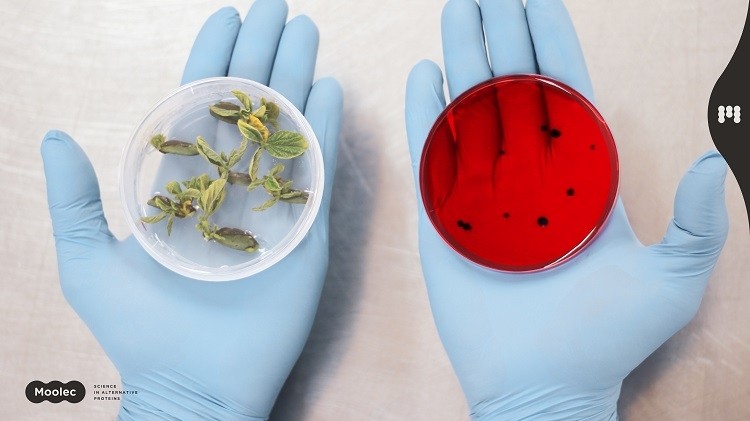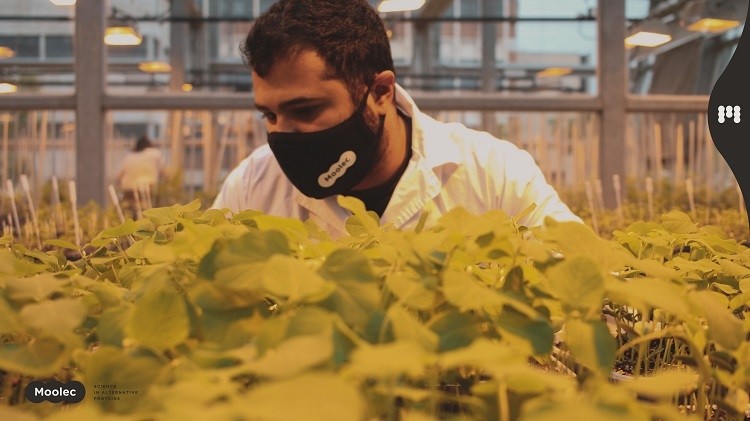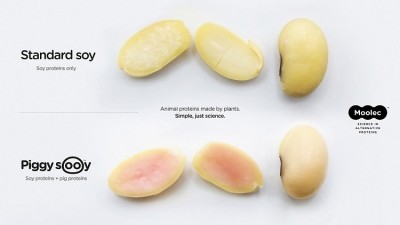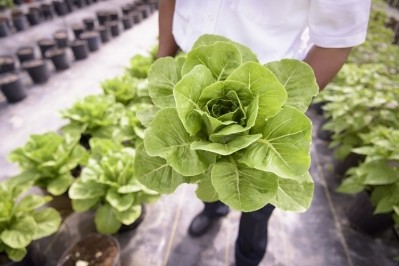Molecular farming for food: How Moolec Science taps ‘the best of plant- and cell-based’ to develop alternative proteins

Molecular farming describes the production of biomolecules and commercial products using plants, rather than bioreactors and fermentation.
The technology has traditionally been leveraged by the pharmaceutical industry. However, entrepreneurs in recent years have started to look beyond life sciences, to examine whether molecular farming can be used for industrial biotechnology – the goal being to produce proteins and enzymes for the food industry.
Gastón Paladini, Henk Hoogenkamp and Martín Salinas are three such entrepreneurs. Together, the founders have formed ag-tech company Moolec Science, which aims to improve the affordability of animal-free solutions in the food supply chain.
A ‘unique’ hybrid concept
While Moolec is newly formed, CTO Salinas has a history of applying molecular farming to food ingredients.
Back in 2008, Salinas led a team that developed a proof of concept enzyme for the cheese market: a functional protein known as bovine chymosin. This chymosin, however, was produced in the safflower plant.
The invention inspired Salinas, Paladini and Hoogenkamp to start working together, CEO Paladini told FoodNavigator. “We wanted to start targeting new proteins for the meat market using other crops.”
The company’s ‘main goal’ is to bring affordable animal-free solutions to market. And this is where molecular farming comes in, he elaborated. “We understood that we could leverage all the efficiencies that the plant has, with the functionality of animal cells, at the same time.
“We are working with the best of plant-based and the best of cell-based to create a unique, hybrid concept.”
Today, Moolec has significantly more interest in categories outside of dairy. To start with, the company is eyeing up opportunities for plant-based functional ingredients in the meat analogue space. “We can help create a modern meat analogue in a unique way, with plant- and cell-based tech at the same time,” the CEO continued.
Pea and soy x bovine and porcine proteins
While headquartered in the UK, Moolec currently has four research lines operating in three geographies: Argentina, the Netherlands, and the US. The company has yet to determine exactly which research lines will be prioritised for commercialisation, but is confident in its selection.
“Right now there are a couple of research lines we’re pursuing. And those research lines are mostly focused on where we think the advantages of molecular farming will shine,” explained CPO Hoogenkamp.
Moolec is currently focusing on soy and pea crops – two of the proteins most commonly used in the plant-based market – to create unique blends of functional proteins from bovine and porcine origins. However, the host plant could be ‘any type of legume’, the CPO stressed. “We’re picking [soy and pea] from a cost and marketing perspective. But it could be anything, it is basically interchangeable.”
The proteins are selected based on their specific functionality, Hoogenkamp explained. This could be to improve texture, taste, or colour. “Proteins are responsible for a lot of the functionality in foods.”
Moolec’s current pipeline will target manufacturers of meat analogues. As it stands, dairy and egg alternatives are out of scope, but ‘they’re not totally off the board’, we were told. “It depends what we stumble across in our research.”
Making plant-based proteins affordable
The company is particularly conscious of being relevant to a wide range of geographies. With an estimated 9.7bn mouths to feed by 2050, Moolec wants to make ingredients for everyone.
Hoogenkamp lamented that a lot of the technologies currently being developed in the alternative protein space are targeting mostly the western world. This, however, will not address a lot of the issues at hand, he said.
“We are aware of the world’s population growth in the upcoming years. Though we esteem the US to be our launching market – considering its size, accessibility, acceptance, and rapid penetration for the kind of solutions we offer – our target is to make the technology as accessible as possible to keep costs at a competitive level.
“This is the differential that will allow us to tackle and capture new markets, not necessarily from developed countries, and extend our business worldwide.”
The CTO used soy protein isolate and pea protein isolate as an example. As regular, functional proteins, these ingredients are already too expensive for two-thirds of the world in food formulation, we were told. “In some cases, they are even more expensive than meat.
“If we want to have an impact on the countries where the population is growing, we need to lower the cost of these isolates. But that’s not possible, because they are already optimised.
“So what can we do? We increase the functionality of the crop itself. That means we’ll be growing crops which are more functional, that don’t need high levels of processing to run.”
It is this element, the lack of heavy processing, that Moolec regards as one of its ‘biggest selling points’. Its technology is easily scaleable, CTO Salinas told FoodNavigator. “Once you have your crop…it is just about recovering the proteins – which is a well-known process in the industry. There is not anything new in the processing side of things.”
It is this focus on the crops that Moolec believes will help ‘bring farmers back into the equation’.
At the same time, the company does not plan on ignoring the western markets. It believes its technology will be very applicable to the US, for example, because Moolec is targeting both lower value and higher value markets.
“There will be a time when plant-based or cell-based will need to come down in price in order to compete with meat,” said Hoogenkamp.
“And at that point, a lot of expensive ingredients [currently on the market] will face scrutiny, not just from a functional point of view but also from a cost point of view. We feel that some of these companies are overinvesting on high-spec ingredients that will never be able to come down to a certain point where we can actually achieve cost parity with meat.”
Concerning regulatory approval, Moolec sees the FDA as its first port of call, followed by Argentina and developing markets.
Such decisions will not be based purely on the perceived acceptance of regulatory bodies, but on consumer perception within those geographies, we were told.


























